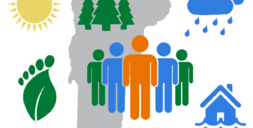Climate change is expected to increase periods of drought and heavy rain events, which can result in increased contamination of drinking water, recreational water and food sources. Harmful contaminants include human and animal waste, industrial chemicals, oils and other fuels, pesticides and fertilizers. Higher temperatures may also cause an increase in pathogens growing in food and water.
Though the affected food and water may smell, look and taste normal, they can cause a range of health impacts.
Diseases that spread through contaminated food and water can cause vomiting, diarrhea, stomach cramps and fever. Children under five years old, adults age 65 and older, pregnant people and people with weakened immune systems are more likely to have experience serious illness from contaminated food or water.
Exposure to water contaminated by chemicals can result in skin and throat irritation, vomiting, diarrhea, fever and other symptoms. Long-term or high-dose exposure can cause organ damage, reproductive issues, developmental problems and even cancer.
Learn more about foodborne & waterborne illnesses


